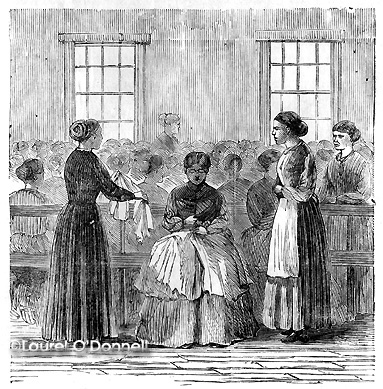|
|
Chapter VI
Institutions of Blackwell's Island.
The New York Penitentiary,
page 3 of 3 The moral condition of prisoners has from a remote period enlisted the sympathies of the benevolent, and led to associated efforts for their relief, yet improvements in prison discipline progressed but slowly until within the last fifty years, leaving still ample scope for the study of the thoughtful. Justice is not often administered with undue severity in our country. Indeed it is frequently quite too lax to promote the public good. Yet the best ends of penal justice are not often secured in our public prisons, and are far too frequently utterly ignored. The object of imprisonment should be three-fold: 1. To separate the culprit from society, whose security he endangers, and whose confidence he has forfeited. 2. To make him sensible of the law he has violated; and 3. To secure if possible his reformation and return to the useful walks of life. The first two parts are tolerably well secured in all countries, but the last and most important is rarely attained, and far too seldom attempted. A keeper of a prison should be selected for his moral qualities, and one who ignores or scoffs at the reformation of a convict thereby demonstrates his utter incompetency for so important a calling. Every possible incentive to reformation should be held out, and every influence introduced and fostered likely to excite the desire of amendment, or to bring up from the depth of his fallen nature the return of buried manhood. While the reformation of the criminal is neglected, a large percentage of those under confinement, especially the younger and more hopeful portion, are certain to return to society more determined villains than when they left it, and the penal institution, instead of suppressing, virtually increases the crime.  Female Convicts, Penitentiary, Blackwell's Island. The Commissioners have had under advisement for some time past the matter of introducing a more rational system of reformatory discipline, than that of mere compulsory toil. The prisoners have been carefully classified, and a system of evening school instruction introduced. The matter of entering the school is entirely voluntary, though after entering they are not allowed to abandon it at pleasure. The school was organized on the evening of November 16, 1869, under the auspices of the School Trustees of the Nineteenth Ward, who provided an able corps of teachers. At the opening session 130 were present as pupils, and on January 10, 1870, the register contained the names of 223 or 64 per cent. of those of the males so situated as to be able to attend. The largest number of pupils were between the ages of eighteen and twenty-two years, the next between twenty-two and twenty-nine, the youngest of all being fourteen, and the eldest fifty-two years of age. The uneducated for the most part appeared anxious to acquire an education, and the more scholarly disposed to farther pursue their studies. For want of room the most judicious separation of the prisoners cannot be secured, but a system of merit marks analogous to the MacConochie, or "Irish system," has been introduced, so that faithful observance of the rules of the prison, and such conduct as secures the approval of the warden receives a monthly recognition, which the Commissioners report to the Governor of the State, recommending an abridgement of their term of confinement. We are happy to be thus able to chronicle the begining of a more rational and humane system of prison discipline for mature criminals, which posterity will develope, and which will doubtless lead to excellent results. Religious services are regularly conducted on the Sabbath by a Protestant and by a Roman Catholic chaplain. |
|
244
:: Previous Page :: Next Page ::
:: Table of Contents :: :: New York State :: :: History Readings :: Books & articles appearing here are modified adaptations
from a private collection of vintage books & magazines. Reproduction of these pages is prohibited without written permission. © Laurel O’Donnell, 1996-2006.
|
|
